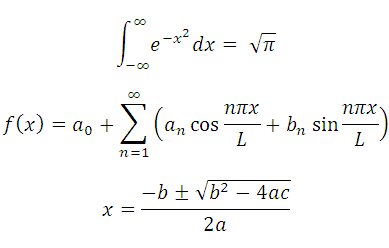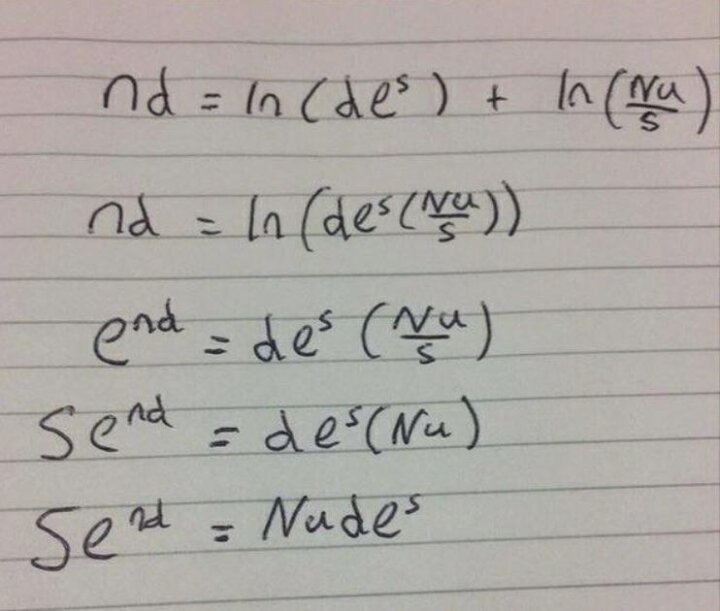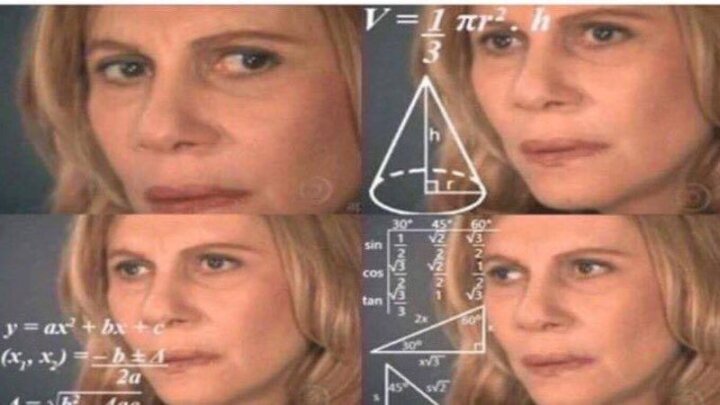Easy! Purple, because aliens don't wear hats.
ArishMell · 70-79, M
If you mean could I perform mathematics to that level... no!
I could manage the third example - I recall as the general formula for solving quadratic equations.
They, and that formula, were in my Maths course at school. So were basic Trigonometry and an introduction to Calculus (both Differentiation and Integration) but certainly not to those levels. It did not include Series, as far as I remember.
So I could not prove your Eqn, 1 to my own satisfaction. I've an idea I have seen a related piece of numerical mysticism that manages to connect pi, e and i (the imaginary thing). Looks pretty but has no practical use!
At least (pi/4) does have a real-world purpose and I have used it occasionally - its first four digits, 0.7854, even sit in a very neat little pattern on the calculator keypad, a sheer fluke making them easy to remember and use!.
In a later Mathematics course I took as an adult student and ending with the standard school examination, we were introduced to Functions. I could never grasp that strange business about many-to-one etc; and I was never sure if they were not just standard equations written in a rather pretentious way to make them Even Harder! So with the Series operator as well your Example 2 is impossible for me. What does it calculate, or what is it for, by the way, or is it simply a puzzle by and for Doctors of Mathematics?
(You may have gathered I like my Maths to have real uses, such as in Engineering and the Sciences of real things. I've long thought there is a breed of Pure Mathematicians dedicated to finding the most arcane and hardest sums of the least use to anyone, or preferably of no use at all!)
I could manage the third example - I recall as the general formula for solving quadratic equations.
They, and that formula, were in my Maths course at school. So were basic Trigonometry and an introduction to Calculus (both Differentiation and Integration) but certainly not to those levels. It did not include Series, as far as I remember.
So I could not prove your Eqn, 1 to my own satisfaction. I've an idea I have seen a related piece of numerical mysticism that manages to connect pi, e and i (the imaginary thing). Looks pretty but has no practical use!
At least (pi/4) does have a real-world purpose and I have used it occasionally - its first four digits, 0.7854, even sit in a very neat little pattern on the calculator keypad, a sheer fluke making them easy to remember and use!.
In a later Mathematics course I took as an adult student and ending with the standard school examination, we were introduced to Functions. I could never grasp that strange business about many-to-one etc; and I was never sure if they were not just standard equations written in a rather pretentious way to make them Even Harder! So with the Series operator as well your Example 2 is impossible for me. What does it calculate, or what is it for, by the way, or is it simply a puzzle by and for Doctors of Mathematics?
(You may have gathered I like my Maths to have real uses, such as in Engineering and the Sciences of real things. I've long thought there is a breed of Pure Mathematicians dedicated to finding the most arcane and hardest sums of the least use to anyone, or preferably of no use at all!)
SomeMichGuy · M
@SW-User Algebraically and sexually correct! 2 x (max marks)!
JPWhoo · 36-40, M
Sometimes. Those aren’t problems though, they’re formulas.
Jenny1234 · 56-60, F
I would definitely find an excuse to get out of that
fun4us2b · M
42
SomeMichGuy · M
Yes, though none of those is complex.
What particularly interested you in mathematics?
What particularly interested you in mathematics?
Alicia23 · 22-25, F
@SomeMichGuy I have always liked numbers
SomeMichGuy · M
@Alicia23 That's fantastic!
Biffed · 31-35, M
i think this is business maths
SomeMichGuy · M
@Biffed No, but you likely saw the last one in high school if you took algebra; it is the "quadratic formula", which gives the solutions to the "quadratic equation"
a(x^2) + bx + c = 0
("Quadratic" means "squared"/"second order"--the highest power of x is 2, so it's a quadratic equation.)
The second one shows a full Fourier representation of a function f(x) defined on a characteristic interval
0 <= x <= L. This special "expansion" is called a "Fourier series", and it shows how a function can be broken down into a constant (a_0) and a set of "even" (cosine) and "odd" (sine) components. Finding them is done by using calculus (integration) and the properties of these functions.
The first formula expresses normalization of the "normal" or "Gaussian" distribution‐‐AKA "the Bell curve". (By "substitution of variables", you can easily extend this to the more typical
e^(‐k[x^2]) for k other than 1.)
a(x^2) + bx + c = 0
("Quadratic" means "squared"/"second order"--the highest power of x is 2, so it's a quadratic equation.)
The second one shows a full Fourier representation of a function f(x) defined on a characteristic interval
0 <= x <= L. This special "expansion" is called a "Fourier series", and it shows how a function can be broken down into a constant (a_0) and a set of "even" (cosine) and "odd" (sine) components. Finding them is done by using calculus (integration) and the properties of these functions.
The first formula expresses normalization of the "normal" or "Gaussian" distribution‐‐AKA "the Bell curve". (By "substitution of variables", you can easily extend this to the more typical
e^(‐k[x^2]) for k other than 1.)
Biffed · 31-35, M
@SomeMichGuy 🤩🤢
katydidnt · 61-69, F
Those aren't problems--they're statements.
StraCat · 41-45, M
Yes I can, but not this one lol.
MrAverage1965 · 61-69, M
Quite simply No
wudifu · 46-50, M
Wtf
Morvoren · F
Nope.
Yes...
ArishMell · 70-79, M
If you mean could I use those, or calculate them, not the first two; but while the first is fairly clearly a statement, what does the second example do? What would it be used for?
BatmanIRL · T
3
masterofyou · M
No 😦 I guess i will just stick with my writing and poetry....
[image/video - please log in to see this content]
Spoiledbrat · F
I can understand some of it but it's been a while.
Sojournersoul · M
Just hurt my head looking at it.
Tumbleweed · F
....crickets....
PhoenixPhail · M
Not that one. I'm terrible at math.
Donotfolowme · 51-55, F
I try like my life






























